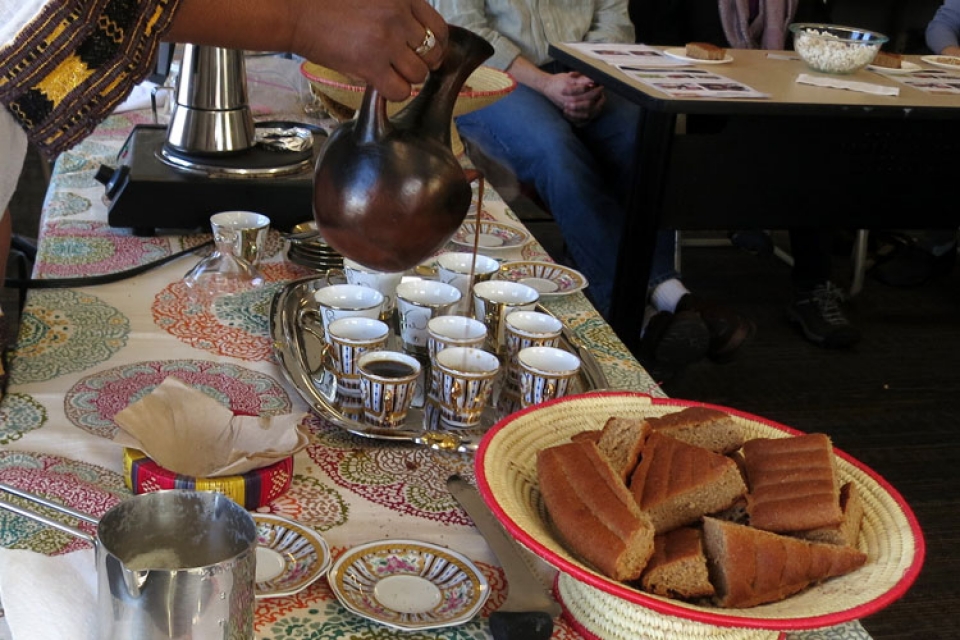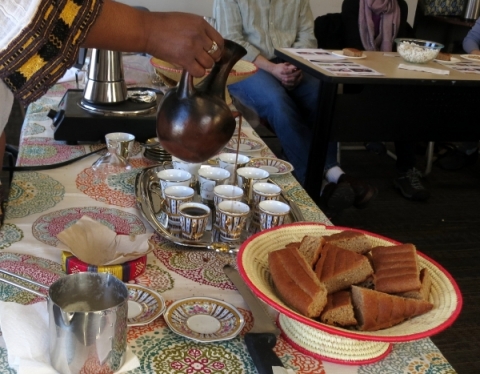Ethiopian Coffee Ceremony: Slowing Down and Catching Up
Last week, City Market hosted an Ethiopian Coffee Ceremony, led by Mulu Tewelde. Mulu grew up in Eritrea (just north of Ethiopia) and moved to Vermont in 2006. She is a successful cook and caterer, leading Authentic Ethiopian Night at Arts Riot with colleague Alganash Michael, as well as doing private catering events. For a unique social, cultural, and food event, she demonstrated an Ethiopian coffee ceremony, true to the way it’s formed every day by women in Ethiopia.
Although now a global staple, it is believed, although not without some controversy, that coffee growing and utilization began in Ethiopia. Countering stories suggest coffee may have started out in nearby Turkey, but the stories are equally interesting on both sides. Ethiopian legend says that coffee was discovered by a goat herder named Kaldi just over 1000 years ago. According to this story, Kaldi’s goats ate the red berries of the coffee plant (from which the green unroasted coffee beans come) and they all began dancing! Kaldi tried them for himself, and brought them to some monks. They all ate the berries and were consequently awake all night long!
The coffee plant produces red fruit, sometimes referred to as berries or cherries. Inside the cherry are two green coffee beans. The beans are roasted to the dark, oily brown we recognize in the coffee shops, in order to bring out different flavors and aromas.
Drinks made from fermenting the berries were created around the same time as the legend of Kaldi, but the first time the bean were roasted wasn’t until about 300 years later. In fact the Yemeni word qahwah translates most closely to the English word wine, referring to the fermented fruit beverage styles. Following the word path, we see the similar-sounding Turkish word kahweh which refers to a drink made from the roasted coffee beans and koffie, a Dutch word, which most closely resembles the English word for coffee.
Roasted coffee drinks quickly became popular throughout the Middle East amongst Muslim communities. During the workshop Mulu showed off two styles of cups. Both were small, almost the size you would use for an Italian espresso. However, the Ethiopian cups have no handle; the Turkish cups do.
Coffee ceremonies in Ethiopia are an integral part of the country’s hospitality and culture. They are performed by the woman of a household, and always done with family, friends, or neighbors. Many women host them three times a day! The hostess wears a decorated white dress and remains seated the entire time, with her guests gathered in a circle. She roasts the green coffee beans in a large shallow pan and grinds them by hand. The grounds are then boiled over coals in a jebana, a clay pot with a long narrow top.
The coffee is served with small cups along with the traditional accompaniments of popcorn, peanuts, and bread. Although many people prefer cream in their coffee today, historically, the coffee would be enjoyed black or with sugar. If children are present, they are sometimes allowed to drink the sweet, sugary bottom of their mother’s cup. Each ceremony involved three rounds of serving. The beans roasted and ground for the first round are re-boiled twice more, and the cups get progressively lighter.
Mulu explained how difficult it can be to hold the still-hot jebana steady, but it is critical to be able to pour the coffee in a slow, even stream high above the cups.
The gathering time is meant to be a leisurely and social affair, many times as neighbors catch up on hours of gossip and community news. However, each ceremony is also an artful and impeccably skillful presentation. Guests are quick to compliment the hostess on her skill with each brew. A quiet group is considered an insult, and guests should sing praise to both the hostess and the coffee throughout the affair. At our ceremony the praises were certainly not undeserving—Mulu roasted the coffee to perfectly dark, nutty flavor and the coffee was rich, smooth, and delightful to sip on.
Each cup took on new flavors, and the gentle, slow routine provided the perfect atmosphere to settle down with our new neighbors. I think we’d all agree, it was a Saturday morning well spent.
For future events, check out our current schedule here and sign up for our Classes & Events newsletter here!


